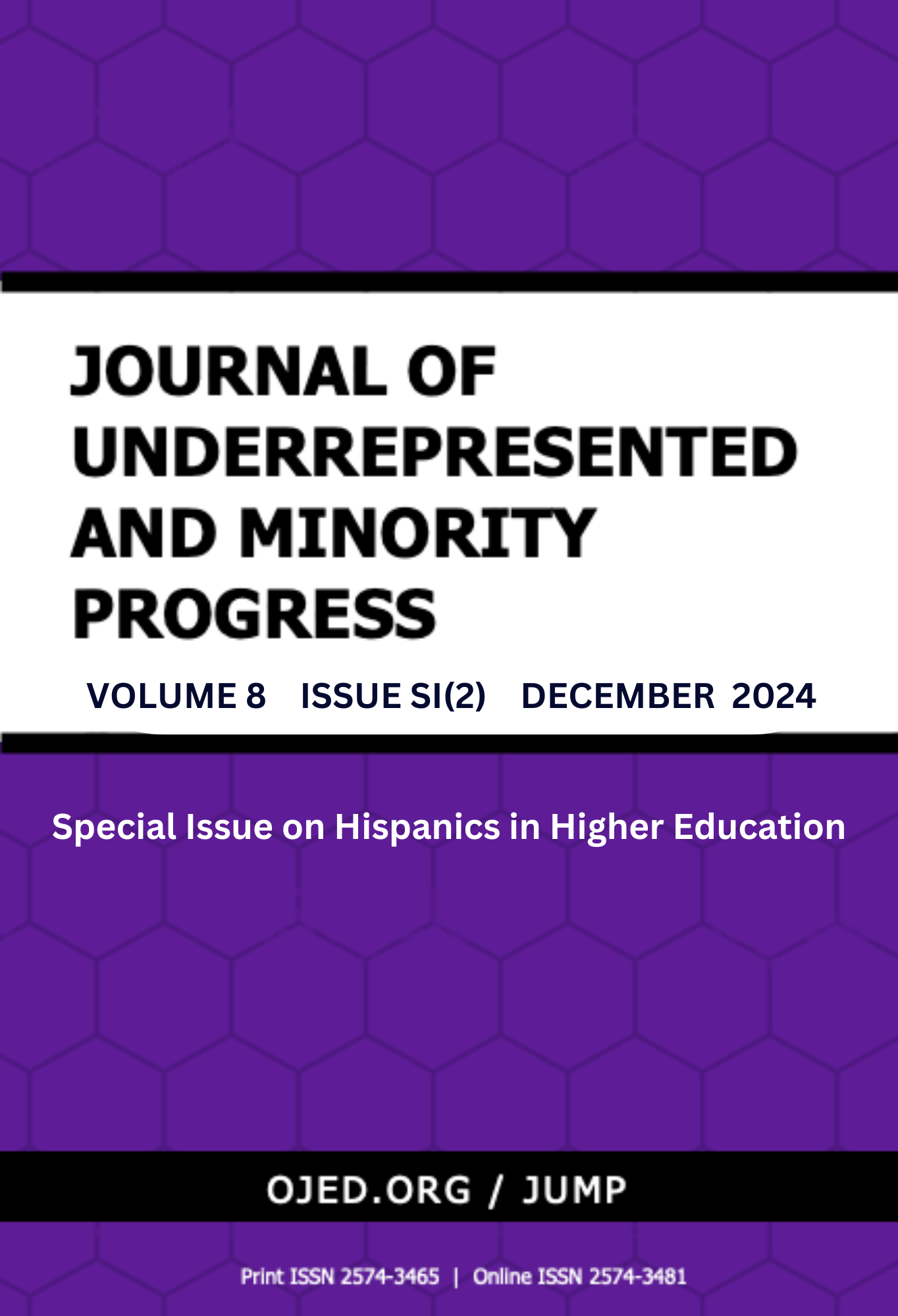Un Mentor Positivo: Supporting Latine & Indigenous First-Generation Doctoral Students
DOI:
https://doi.org/10.32674/n2sx2t62Keywords:
Doctoral Student of Color, Faculty of Color, First-Generation Student, Latine, Indigenous, MentorAbstract
Doctoral completion for first-generation Latine students in the United States is minimal. In 2021, 9% of the doctorates confirmed belonged to those identified as Latine, and 41.3% of that population identified as a first-generation college student. This phenomenological study used content analysis to understand the experiences of 15 doctoral students of color at a Predominantly White Institution (PWI). This paper draws from that larger study highlighting the voices of four first-generation Latine and Indigenous doctoral students. Findings share experiences specific to the population and the importance of having a faculty mentor of color who understands the multiple intersections of marginalized doctoral student identities and the support needed for a truly equitable academic experience for first-generation doctoral students of color at PWIs.
References
Alutto, J. A. (2015, December 21). Small pool of minority candidates no excuse for lack
of diversity. The Chronicle of Higher Education. https://www.chronicle.com/blogs/letters/small-pool-of-minority-candidates-no-excuse-for-lack-of-diversity/
Berg, G. A. (2016). Low-income students and the perpetuation of inequality: Higher
education in America (1st ed.). Routledge.
Cavote, S., & Kopera-Frye, K. (2007). Non-traditional student persistence and first year
experience courses. Journal of College Student Retention: Research, Theory & Practice, 8(4), 477-489. https://doi.org/10.2190/q166-2010-51t4-852l
Chakraverty, D. (2022). Impostor phenomenon among Hispanic/Latino early career
researchers in STEM fields. Journal of Latinos and Education,1-19.
Clance, P. R., & Imes, S. A. (1978). The imposter phenomenon in high achieving women:
Dynamics and therapeutic intervention. Psychotherapy: Theory, Research & Practice, 15(3), 241-247. https://doi.org/10.1037/h0086006
Crenshaw, K. (1991). Mapping the margins: Intersectionality, identity politics, and
violence against women of color. Stanford Law Review, 43(6), 1241. https://doi.org/10.2307/1229039
Dickson, T., & Zafereo, J. (2021). Faculty and programmatic influences on the
percentage of graduates of color from professional physical therapy programs in the united states. Advances in Health Sciences Education: Theory and Practice, 26(1), 215-235.
Espino, M. M. (2014). Exploring the role of community cultural wealth in graduate
school access and persistence for mexican american PhDs. American Journal of Education, 120(4), 545-574. https://doi.org/10.1086/676911
Gardner, S., & Holley, K. (2011, February 10). “Those invisible barriers are real”: The
progression of first-generation students through doctoral education. Taylor & Francis. https://doi.org/10.1080/10665684.2011.529791
Holley, K. A., & Gardner, S. (2012). Navigating the pipeline: How socio-cultural influences impact first-generation doctoral students. Journal of Diversity in Higher Education, 5(2), 112-121. https://doi.org/10.1037/a0026840
Hoffer, T., Sederstrom, S., Selfa, L., Welch, V., Hess, M., Brown, S., Reyes, S., Webber, K., & Guzman-Barron, I. (2003). Doctorate recipients from United States universities: Summary report 2002. National Science Foundation.
Hossler, D. & Bontrager, B. (2014). Handbook of strategic enrollment management. John Wiley & Sons.
Jaeger, A. J., & Haley, K. J. (2016). My story, my identity: Doctoral students of color at a research University. Qualitative Research in Education, 5(3), 276. https://doi.org/10.17583/qre.2016.2019
Martínez, D. E., & Gonzalez, K. E. (2020). “Latino” or “Hispanic”? The Sociodemographic correlates of Panethnic label preferences among U.S. Latinos/Hispanics. Sociological Perspectives, 64(3), 365-386. https://doi.org/10.1177/0731121420950371
Mitic, R. R. (2022). Insights into First-Generation Doctoral Students. PhD Career Pathways: A Project of The Council of Graduate Schools.
https://cgsnet.org/wp-content/uploads/2022/03/CGS_CP_First-Gen-Doc-Students_ForWeb.pdf
Nunez, A. M., & Cuccaro-Alamin, S. (1998, June 10). First-generation students: Undergraduates whose parents never enrolled in postsecondary education. National Center for Education Statistics (NCES), a part of the U.S. Department of Education. https://nces.ed.gov/pubsearch/pubsinfo.asp?pubid=98082
Patel, V. (2015, December 4). Dearth of Black Ph.D. Recipients will complicate efforts to diversify faculty. The Chronicle of Higher Education. https://www.chronicle.com/article/dearth-of-black-ph-d-recipients-will-complicate-efforts-to-diversify-faculty/
Phu, C. N. (2020). Sleepless in school: A first-generation doctoral student mother of Color’s journey. Women, Gender, and Families of Color, 8(2), 241-247.
Sarcedo, G. L. (2020). We Stay Fly: Composite counterstories of academic success and graduation among first-generation low-income college students of Color (Publication No. 28256471) [Doctoral dissertation]. ProQuest Dissertations and Theses Global.
Sarcedo, G. L. (2022). Using narrative inquiry to understand faculty supporting first-generation, low-income college students of color. Journal of First-generation Student Success, 1-16. https://doi.org/10.1080/26906015.2022.2086087
Schuyler, S. W., Childs, J. R., & Poynton, T. A. (2021). Promoting success for first-generation students of color: The importance of academic, transitional adjustment, and mental health supports. ScholarWorks at WMU. https://scholarworks.wmich.edu/jca/vol6/iss1/4
Survey of Earned Doctorates. (2021, October 5). Survey of earned doctorates | NCSES | NSF. NSF - National Science Foundation. https://www.nsf.gov/statistics/srvydoctorates/
Tate, K. A., Fouad, N. A., Marks, L. R., Young, G., Guzman, E., & Williams, E. G. (2015). Underrepresented first-generation, low-income college students’ pursuit of a graduate education. Journal of Career Assessment, 23(3), 427-441. https://doi.org/10.1177/1069072714547498
Vanwagoner, R. (2018). Competing on culture: Driving change in community colleges. Futures Series on Community Company.
Wallace, J. K., & Ford, J. R. (2021). “They don’t value my knowledge”: Interrogating the racialized experiences of Black first-generation doctoral students in HESA programs at HWIs. Journal of First-generation Student Success, 1(2), 127-144. https://doi.org/10.1080/26906015.2021.1930290
Wallace, J. K. (2022). Nevertheless, we persist: Exploring the cultural capital of Black first-generation doctoral students at Non-Black serving institutions. The Review of Higher Education, 45(4), 515-548. https://doi.org/10.1353/rhe.2022.0005


